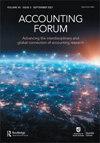欧盟审计期望差距与强化的独立性标准:衡量欧盟新指令的效果
IF 3.4
4区 管理学
Q2 BUSINESS, FINANCE
引用次数: 2
摘要
欧盟通过双重强化审计师独立性来解决审计师可能存在的道德风险。这是通过制定一项独立的一般原则,并结合保障和禁止的预防性和制裁框架来实现的。本文评估了审计期望差距是否引发了对审计师独立性保护的转变。该指令提供了一个新的框架来协调和保护欧盟审计师的独立性。本文涵盖了欧盟新审计法规对审计师独立性伦理问题的影响及其与审计期望差距的联系。对192名抽样审计员进行了定性研究。根据结构方程建模方法(PLS-SEM),我们的结果显示了审计期望差距与审计师独立性之间关系的证据。此外,研究结果还表明,当存在审计期望差距时,新的审计保障措施和质量控制措施以及保护独立性的制裁制度具有中介作用。结果还表明,在最新的欧洲改革中考虑的更具限制性的审计师禁令对保护审计师独立性具有积极作用。本文章由计算机程序翻译,如有差异,请以英文原文为准。
The audit expectation gap and strengthened independence standards in the European Union: measuring the effects of the new EU Directive
ABSTRACT The European Union has addressed the moral hazard that auditors may present by doubly reinforcing auditor independence. This has been done through the formulation of a general principle of independence in conjunction with a preventive and sanctioning framework of safeguards and prohibitions. This article evaluates whether the audit expectation gap has provoked a shift towards increasing the protection of auditor independence. The Directive provides a new framework to harmonise and protect auditor independence in the EU. The article covers a gap in relation to the effects of new auditing regulations within the EU affecting the ethical problem of auditor independence and its connection to the audit expectation gap. A qualitative study addressed to a sample of 192 auditors has been developed. Following the structural equation modelling methodology (PLS-SEM), our results display evidence of a relationship between the audit expectation gap and auditor independence. Furthermore, the results show a mediating effect of new auditor safeguards and quality controls and a sanctioning system to protect independence when an audit expectation gap exists. The results also show that the more restrictive auditor prohibitions considered in the latest European reform have a positive effect on the protection of auditor independence.
求助全文
通过发布文献求助,成功后即可免费获取论文全文。
去求助
来源期刊

Accounting Forum
BUSINESS, FINANCE-
CiteScore
5.20
自引率
6.50%
发文量
0
期刊介绍:
Accounting Forum publishes authoritative yet accessible articles which advance our knowledge of theory and practice in all areas of accounting, business finance and related subjects. The journal both promotes greater understanding of the role of business in the global environment, and provides a forum for the intellectual exchange of academic research in business fields, particularly in the accounting profession. Covering a range of topical issues in accounting, business finance and related fields, Accounting Forum''s main areas of interest are: accounting theory; auditing; financial accounting; finance and accounting education; management accounting; small business; social and environmental accounting; and taxation. Of equal interest to practitioners, academics, and students, each issue of the journal includes peer-reviewed articles, notes and comments section.
 求助内容:
求助内容: 应助结果提醒方式:
应助结果提醒方式:


